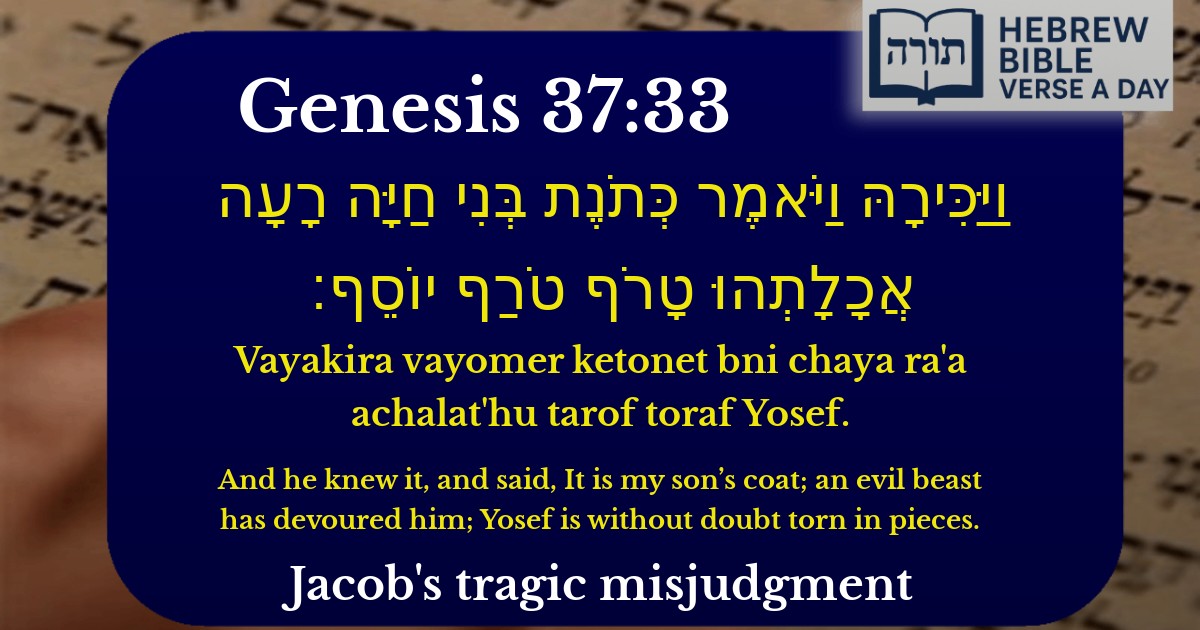Frequently Asked Questions
Q: What does the verse 'It is my son’s coat; an evil beast has devoured him; Yosef is without doubt torn in pieces' mean?
A: This verse describes Yaakov (Jacob) recognizing Yosef's (Joseph's) torn and bloodied coat, which his other sons presented to him as 'proof' that Yosef had been killed by a wild animal. According to Rashi, Yaakov was misled by his sons, who had actually sold Yosef into slavery. The phrase 'טָרֹף טֹרַף' (torn in pieces) emphasizes Yaakov's grief and his belief that Yosef was dead.
Q: Why is this verse important in the story of Yosef?
A: This verse marks a turning point in the story of Yosef, as it shows Yaakov's deep sorrow and the deception by Yosef's brothers. According to the Midrash (Bereshit Rabbah), Yaakov's excessive mourning was a consequence of his earlier favoritism toward Yosef. The verse sets the stage for the eventual reconciliation and fulfillment of Yosef’s dreams, showing Divine Providence at work.
Q: What can we learn from Yaakov's reaction in this verse?
A: Yaakov's reaction teaches us about the pain of losing a child and the dangers of favoritism among siblings, as discussed in the Talmud (Shabbat 10b). Additionally, the Rambam (Hilchot De'ot) teaches that excessive grief can cloud judgment—Yaakov's despair prevented him from suspecting his other sons' deception. The story reminds us to seek truth even in moments of sorrow.
Q: How does this verse apply to our lives today?
A: This verse reminds us of the consequences of deception and the importance of honest communication within families. The Talmud (Pesachim 113b) warns against misleading others, as Yosef’s brothers did. It also teaches that even in moments of despair, we should trust in Hashem’s plan, as Yosef’s 'death' ultimately led to the survival of the Jewish people in Egypt.
Q: Why did Yaakov believe Yosef was dead instead of suspecting his other sons?
A: According to Rashi and the Midrash (Tanhuma Vayeshev 8), Yaakov had previously warned Yosef about his brothers' jealousy, but he never imagined they would go so far as to harm him. Additionally, the brothers swore an oath and used Yosef’s coat as 'evidence,' making their story convincing. The Zohar explains that Yaakov’s prophetic vision was temporarily blocked due to Divine decree, allowing the brothers' plan to unfold.


Yaakov's Recognition of Yosef's Ketonet
The verse (Bereshit 37:33) describes Yaakov's reaction upon seeing Yosef's blood-stained tunic. Rashi explains that Yaakov recognized the garment immediately, noting that it was indeed Yosef's ketonet (tunic). However, the brothers had dipped it in goat's blood to deceive their father into believing Yosef had been killed by a wild animal.
Yaakov's Assumption of Yosef's Death
Yaakov exclaims, "חַיָּה רָעָה אֲכָלָתְהוּ" ("an evil beast has devoured him"). The Midrash (Bereshit Rabbah 84:19) suggests that Yaakov's use of the term חַיָּה רָעָה ("evil beast") alludes not only to a literal wild animal but also to the brothers' deceit—symbolizing their harsh treatment of Yosef. Ramban adds that Yaakov's grief was compounded by his inability to perform kriah (the traditional rending of garments upon hearing of a death) since the brothers did not bring a body for burial.
The Repetition of "טָרֹף טֹרַף"
The phrase "טָרֹף טֹרַף יוֹסֵף" ("Yosef is without doubt torn in pieces") employs a doubled verb (טָרֹף טֹרַף), which the Talmud (Sanhedrin 101b) interprets as emphasizing certainty—Yaakov was convinced Yosef had been killed. The Kli Yakar notes that this repetition also hints at Yaakov's subconscious suspicion that the brothers were involved, as the word טֹרַף can imply human violence (as in Shemot 22:12).
Yaakov's Refusal to Be Comforted
Later in the parsha (Bereshit 37:35), Yaakov refuses to be comforted, which the Midrash (Bereshit Rabbah 84:21) explains was due to a prophetic sense that Yosef was still alive. The Or HaChaim suggests that Yaakov's excessive mourning—contrary to halachic norms—stemmed from his guilt over sending Yosef alone to his brothers, knowing their animosity.